
REDDIE's
SUSTAINABILITY
Our sustainability story is simple.
We use premium discarded materials for the majority of our product line, and we continue to innovate to create new materials out of discarded materials. These, so far, include reclaimed premium solid teak wood & recycled bottle tops, and single-use plastics.
Our goal is to have 100% of our products made from discarded materials.
We also make furniture to order, with pieces designed to meet a need and not a trend. All designs are naturally crafted and not mass produced, and can be tailored to your specific project so you find something you are going to keep.
We own our own production so we can guarantee the origin of each material we use, as we control the end to end supply chain.
Our REDDIE factory in Indonesia is FSC-certified for post-consumer reclaimed material.
100 % RECLAIMED
SOLID TEAK WOOD
Our standard solid teak wood is a premium wood reclaimed and salvaged from demolished buildings. Our factory is based in Java Indonesia, where many buildings, homes, and furniture are made from local solid teak wood. When this wood is discarded, we intercept it from landfills and use it for our furniture.
Environmental Benefits
Choosing reclaimed wood makes a significant positive impact on the environment. It directly reduces deforestation by decreasing the demand for newly harvested timber, which in turn helps protect vital forest ecosystems and their biodiversity. This also contributes to combating climate change. The process of harvesting, transporting, and milling new wood is energy-intensive, so using reclaimed materials results in a lower carbon footprint due to less processing and fewer associated greenhouse gas emissions. Furthermore, diverting wood from landfills minimises waste, preventing it from decomposing and releasing methane, a potent greenhouse gas. Ultimately, it supports a more circular economy by repurposing valuable resources.
Durability and Strength
One of the standout advantages of reclaimed wood is its inherent durability and strength. Much of this timber comes from old-growth trees that grew slowly over centuries, resulting in incredibly dense and stable wood. Because it has already been time-tested, often enduring decades or even centuries of structural stress and exposure to elements in its previous life (like in old barns or factories), reclaimed wood has proven its resilience. This makes it far less prone to common issues like warping, cracking, or splitting that can affect newer, less mature timber. In many cases, it's also significantly harder than virgin wood available today.
FSC CERTIFIED PRODUCTION
CHAIN OF CUSTODY
REDDIE is proud to hold Forest Stewardship Council (FSC) Chain of Custody certification for our production processes, specifically to verify the traceability of our reclaimed wood. This certification demonstrates our commitment to responsible forestry and sustainable practices throughout our supply chain.
This rigorous system ensures traceability and integrity of our post-consumer reclaimed materials. The FSC defines 'post-consumer reclaimed material' as: "Material that is reclaimed from consumer or commercial products that have been used for their intended purpose by end-users." By prioritising these materials, we actively divert waste from landfills and reduce the demand for virgin timber, aligning with our circular economy principles. Our factory holds specific FSC certification for our post-consumer reclaimed wood production.
To qualify for chain of custody certification your organization must implement a management system that ensures the following.
FSC Commitment to Responsible Sourcing
The forest-based materials we use are FSC-certified. This includes any reclaimed materials we incorporate. We ensure that all FSC-certified material is identified and tracked diligently throughout our manufacturing and distribution processes. Furthermore, we meticulously keep all documents and records relating to our FSC-certified product production, purchase, and sales.
FSC Core Labour Standards
Beyond our commitment to sustainable sourcing, we also firmly meet FSC’s core labour requirements. This means we guarantee:
There is no child or forced labour within our operations.
We practice no discrimination in employment and occupation.
We uphold the freedom of association and the right to collective bargaining.
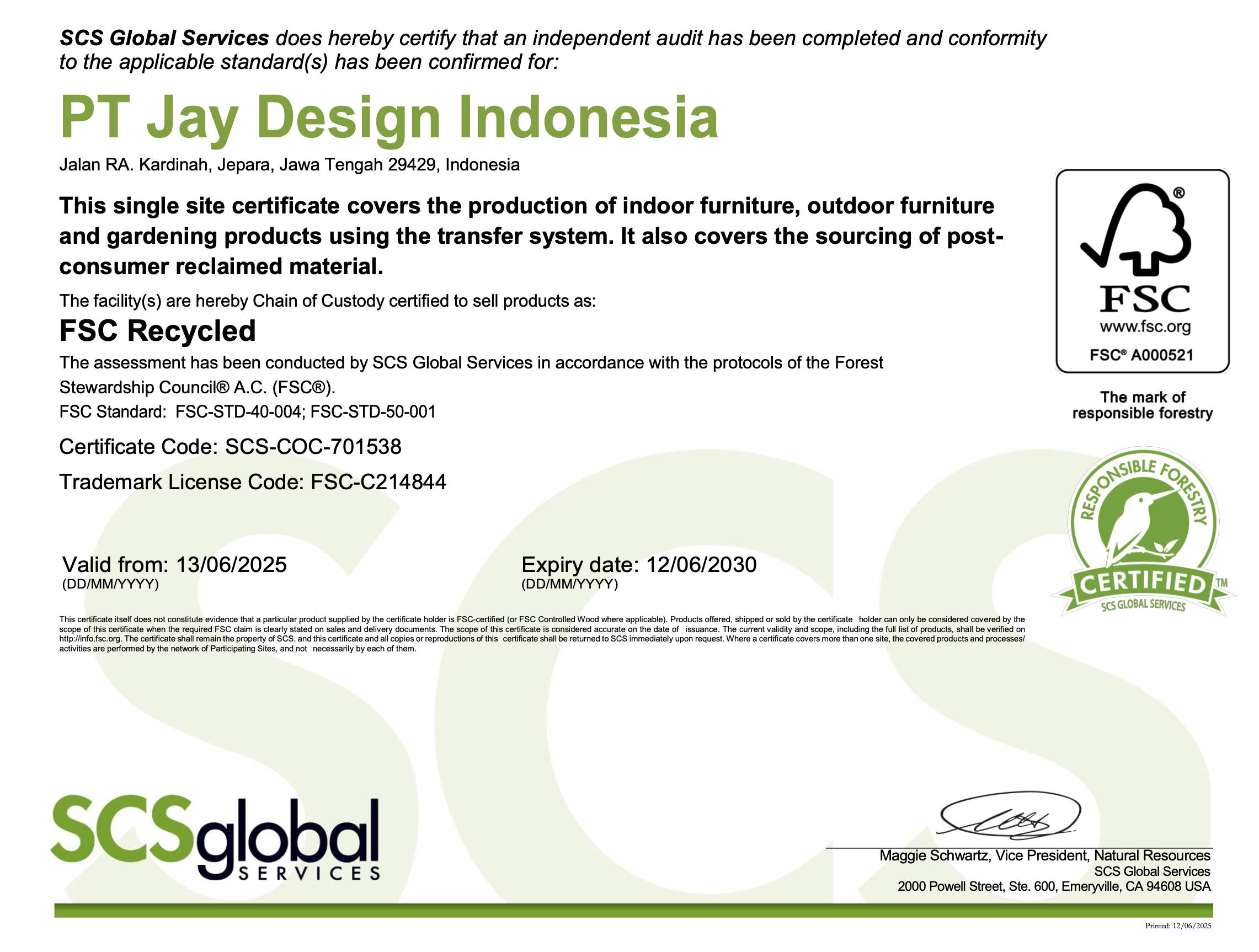
Our factory FSC certificate under PT Jay Design Indonesia
(Fun fact we named the factory Jay after our founders daugther and REDDIE is named after their son Eddie!)
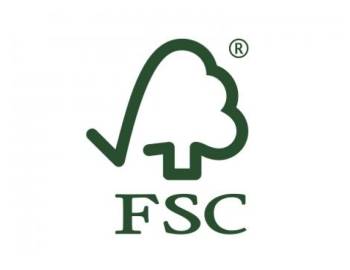
100 %
RECYCLED PLASTIC
The Problem
Indonesia faces a critical plastic waste crisis, with millions of tonnes of unmanaged plastic entering its waterways and oceans annually, devastating marine ecosystems and introducing microplastics into the food chain. Compounding this, many developed nations (including Australia, UK and USA) have shifted their plastic waste exports to Indonesia after China's 2018 ban, often sending contaminated or non-recyclable materials that are then illegally dumped or openly burned, exacerbating environmental and health problems for local communities.
Our Solution
Crafted from bottle tops, bottles, and other plastic waste, our durable, terrazzo-like material relies on Indonesian trash aggregators. Acting as crucial intermediaries, these aggregators collect waste from diverse sources, including informal waste pickers (pemulung), community waste banks, and sometimes directly from households and businesses. This process is vital for Indonesia’s waste management, tackling plastic pollution by diverting materials from landfills and oceans while supporting local livelihoods through a grassroots supply chain that ensures consistent material quality.
Environmental Benefits
Recycled HDPE offers significant advantages, primarily by reducing landfill waste and conserving natural resources (like fossil fuels), while also lowering energy consumption and greenhouse gas emissions associated with new plastic production, thus promoting a circular economy. Materially, it retains HDPE's inherent durability, strength, and resistance to weather and chemicals, leading to long-lasting products.
OUR
PEOPLE
Northern Java Indonesia has been renowned for its woodworking for centuries, from early Javanese and Islamic influences to the Dutch colonial period. The region is known for intricate carvings and exceptional woodworking talents that blend traditional skills with modern styles. All designs are celebrated for being naturally crafted and not mass produced.
We own our own production in Indonesia, where each employee is directly employed by our business. This way we can ensure every person is being paid above award wages and paid overtime. We additionally support our staff by paying for any further education they wish to undertake, and having team building activities such as aerobics classes, sports days, and external outings.
CERTIFICATIONS
We work with architect, designers and building owners to meet requirements for Green Building fit outs. We have created furniture for several green buildings such as as WELLS, Greenstar and LEED. Contact us at hello@reddie.co for further information.
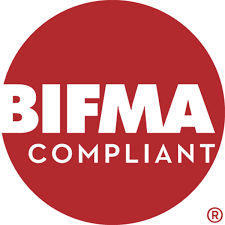
We have products that approved and have been tested under the rigorous BIFMA American commercial rating.
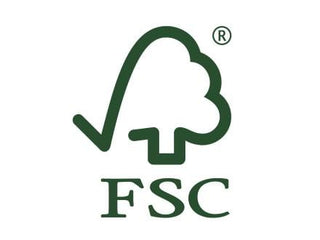
Our factory and timber production is FSC-certified for post-consumer reclaimed material.
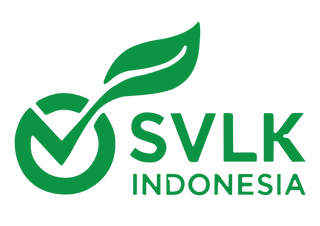
Our factory is audited annually to ensure its has above required standards required for an ethical production.
Licence No. 449/LVK-009/TRANsTRA
We have produced products for green buildings such as Green Star and Wells Rated projects. Due to our transparent production and FSC certified wood & production we can provide all of the correct documentation for furniture points to contribute to overall certification.
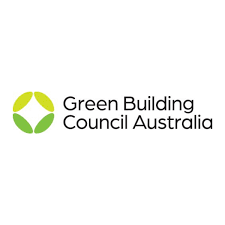
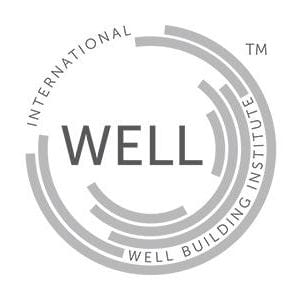
WASTE
MANAGEMENT
Our furniture is wrapped in recycled paper and cardboard and delivery furniture packaging is taken away to be recycled.
Beyond certification requirements, we feel as a business we need to take additional steps to be sustainable. When Caroline, our founder, set up the factory she noticed there were smaller offcuts of wood, metal and marble that she didn’t want to waste.
With her team, she designed a collection of smaller accessories such as bowls, wall hooks and accessories to utilise this waste. Marble offcuts are given to the community to be used for paving and home cladding.
PRODUCT
STEWARDSHIP
We aim to enhance the life cycle of Reddie furniture and reduce waste through sustainable measures via reuse, refurbishment or recycling. Our items are designed so they can be easily maintained and/or refurbished at end of life. Upholstered pieces can be removed for cleaning or be repaired, whilst timber can be sanded and refinished if needed. Where possible, we will take back furniture sold by Reddie to reuse or find alternatives to sending products to landfill. Options include:
(i) Refurbishment of furniture for possible reuse by the existing customer.
(ii) On-selling or donation of furniture in it's existing condition to other commercial businesses or organisations.
(iii) Disassembly of furniture for components/materials reuse or recycling.
Our Product Stewardship initiatives will continue to evolve as we look to provide cost effective solutions that are environmentally beneficial and economically viable.


2025
SUSTAINABILITY REPORT
SUSTAINABILITY by Caroline Olah
